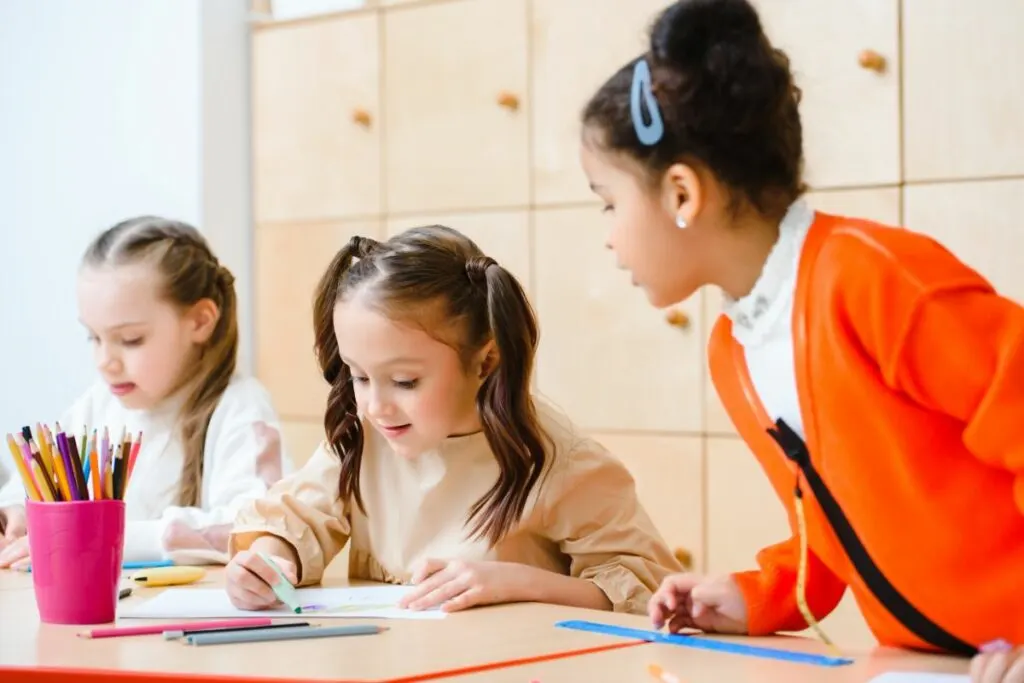Deciding between homeschooling and traditional schooling is a significant choice that families often grapple with, and as we attempt to help you navigate this decision-making process, we’ll encounter notable disparities in both approaches.

We’ll delve into the dissimilarities, advantages, and disadvantages of homeschooling vs. traditional schooling and hopefully provide some insight into the educational landscapes that parents have to explore.
The Educational Environment
One of the primary distinctions between homeschooling and traditional schooling is the learning environment, as traditional schools offer structured, classroom-based learning.
Homeschooling provides a flexibility that allows education to unfold within the comfort of a familiar environment.
This flexibility can be particularly beneficial for children who thrive in a personalized setting and who function best in a place where they feel comfortable and safe.
Curriculum Customization
Homeschooling stands out for its flexibility in the curriculum as parents can tailor it to their child’s learning style and pace, which encourages a more profound understanding of subjects.
Traditional schools adhere to standardized curricula designed for large groups, which can potentially leave some students behind.
The ability to customize a curriculum is a significant advantage for homeschooling, as it ensures that each child’s educational journey is uniquely tailored to their needs and can be delivered at a pace that suits the child instead of a standardized timetable.
Social Interaction
A critical consideration is social interaction, as traditional schooling provides consistent interaction with peers, which helps to develop essential social skills as students learn to navigate social dynamics, work in groups, and build relationships.
In homeschooling, deliberate efforts are required to create social opportunities, ensuring children develop interpersonal skills beyond the family circle, and while homeschoolers can engage in community activities, join clubs, and participate in group events, it requires proactive planning on the part of parents.
Individualized Attention
An advantage of homeschooling is the ability to provide individualized attention, as in a school setting, teachers often face numerous challenges when attempting to cater to the diverse needs of a large classroom.
Homeschooling allows parents to identify and address individual strengths and weaknesses, which makes sure that each child receives the attention they need to succeed academically.
Learning Pace
Flexibility in learning pace is another crucial factor, and homeschooling allows students to delve deeper into subjects of interest or spend additional time on challenging topics.
This flexibility is invaluable in cultivating a genuine love for learning, but in traditional schools, the pace is generally standardized, which can potentially leave some students struggling to keep up while others may find the material unchallenging and, as a result, can, ultimately disengage from, and with, education.
Academic Performance
Numerous studies show that homeschoolers often outperform their traditionally schooled counterparts academically, and this success may be attributed to the personalized approach and the ability to focus on the aforementioned individual strengths and weaknesses.
Homeschooling provides an environment where children can wholeheartedly grasp concepts, and parents can tailor teaching methods to suit their child’s learning style and strengths.
Time Flexibility
Homeschooling affords the luxury of time flexibility, which allows for unique learning opportunities, such as field trips, real-world experiences, and extended exploration of subjects.
Traditional schools operate on a fixed schedule, which may limit the time available for in-depth exploration or pursuing specific areas of interest.
Parental Involvement
Homeschooling necessitates significant parental involvement, and this increased engagement in a child’s education can strengthen the parent-child bond, but it does require dedication and time.
Parents become not only educators but also learning facilitators and actively participate in their child’s academic journey.
It isn’t for everyone, and we strongly advise that you think long and hard about whether or not it’s a journey that you want to embark on.
Extracurricular Activities
Traditional schools offer a range of extracurricular activities, from sports to clubs, fostering holistic development, and students have the opportunity to explore diverse interests and develop teamwork and leadership skills.
While they can access similar opportunities through community programs, they may need to be more proactive in seeking them out, and this is one of the areas where parental involvement is crucial in ensuring a well-rounded educational experience.
Standardized Testing
One drawback of homeschooling is the potential lack of exposure to standardized testing, and even though some educators argue that this reduces stress, others believe it may hinder a child’s ability to perform well in future academic settings.
Standardized testing is a prevalent feature of traditional schooling and provides a benchmark for academic performance, but homeschoolers can still prepare for standardized tests through specialized programs and resources.
Teacher Qualifications
In traditional schools, teachers are required to meet specific educational standards and undergo rigorous training and certification processes to ensure they are well-equipped to teach.
Homeschooling, however, relies on the parents’ qualifications, raising questions about the consistency and quality of education.
Even though many homeschooling parents are highly capable educators, there is a potential variation in educational backgrounds and teaching styles.
Cost Of Homeschooling Vs. Traditional Schooling
Traditional schooling is often associated with costs such as tuition, uniforms, and extracurricular fees, and homeschooling while requiring an initial investment in supplies, can be more cost-effective in the long run.
Homeschooling eliminates many of the traditional costs associated with schooling, and resources can often be reused for multiple children, but the financial impact is entirely dependent on the chosen curriculum and the availability of educational resources.
Diversity Of Perspectives
Traditional schools expose students to a diverse range of perspectives, which can potentially create a broader worldview as students interact with peers from different backgrounds, which helps to enhance cultural awareness.
However, homeschooling, if not supplemented with diverse experiences, might inadvertently limit exposure to varying viewpoints, so families need to actively seek out opportunities for cultural enrichment to ensure a well-rounded education that includes diverse perspectives.
Transition To Higher Education
Concerns often arise regarding the transition from homeschooling to higher education, and while many homeschoolers successfully transition to college, some institutions may require additional documentation to assess their preparedness.
Parents and home-based educators need to carefully plan for the college application process to make sure their children meet admission requirements, and this may involve standardized testing, portfolios of work, and letters of recommendation.
Time Management Skills
Homeschooling cultivates strong time management skills as students learn to balance academic responsibilities with other daily activities, and they acquire the ability to set goals, prioritize tasks, and manage their time effectively.
Traditional schools, with set schedules, may not provide the same level of autonomy, but the structured nature of traditional schooling can instill a sense of discipline and routine in students, which are valuable skills all children need for their academic and professional lives.
Parental Burnout
The responsibility of homeschooling can lead to parental burnout, especially for those juggling work and teaching, while traditional schooling, by distributing the teaching load among professionals, can alleviate this pressure.
Parents who choose to homeschool need to be aware of the potential for burnout, and it’s essential to establish a support system, share responsibilities, and take breaks to prevent exhaustion.
Special Needs Education
Traditional schools often have specialized resources and trained professionals to support students with special needs, and homeschooling, while adaptable, may require additional resources and expertise.
Families with children who have special needs face unique challenges in both homeschooling and traditional schooling, and the latter often have dedicated special education programs, while the former may need to seek out specialized resources and support groups.
It’s a big decision and depends on the individual needs of the child and the available resources in the community.
Peer Pressure And Bullying
Traditional schools expose children to peer pressure and potential bullying, which can be absent or easier to manage in a homeschooling environment, and even though peer interactions in traditional schools can help to shape a child’s social development positively, they can also expose them to negative influences and the possibility of bullying.
Homeschoolers, while avoiding traditional peer pressure, need to actively facilitate positive social interactions, and widespread concerns about bullying in traditional schools have led some parents to opt for homeschooling as a safer alternative.

Homeschooling Vs. Traditional Schooling – The Pros And Cons
Pros Of Homeschooling
- Customized Curriculum: Tailors the curriculum to the child’s learning style.
- Individualized Attention: Provides focused attention to address individual strengths and weaknesses.
- Flexible Learning Pace: Allows students to delve deeper into subjects of interest.
- Time Flexibility: Facilitates unique learning opportunities and field trips.
- Strong Parental Involvement: Strengthens the parent-child bond and active participation in the child’s academic journey.
- Cost-Effective: Eliminates many of the traditional costs associated with schooling.
Cons Of Homeschooling
- Limited Social Interaction: Requires proactive efforts to create social opportunities.
- Potential Lack of Standardized Testing Exposure: Raises concerns about future academic performance.
- Parental Qualifications: Relies on the parents’ qualifications, which can lead to potential variations in teaching styles.
- Parental Burnout: The responsibility of teaching can lead to burnout, especially for parents juggling work and teaching.
- Transition to Higher Education: Requires careful planning and additional documentation for college admission.
Pros Of Traditional Schooling
- Consistent Social Interaction: Provides opportunities for regular peer interaction.
- Diverse Extracurricular Activities: Offers a range of activities for holistic development.
- Exposure to Standardized Testing: Prepares students for standardized tests commonly used in higher education.
- Structured Learning Environment: Instills discipline and routine in students.
- Specialized Resources for Special Needs: Offers dedicated resources and support for students with special needs.
Cons Of Traditional Schooling
- Limited Curriculum Customization: Follows a standardized curriculum designed for large groups.
- Less Individualized Attention: Teachers face challenges in catering to diverse needs in a large classroom.
- Fixed Learning Pace: Potentially leaves some students struggling or unchallenged.
- Limited Time Flexibility: Operates on a fixed schedule, limiting time for in-depth exploration.
In weighing the pros and cons of homeschooling versus traditional schooling, it’s crucial to recognize that each approach has its merits and drawbacks, and the decision ultimately hinges on the unique needs and preferences of the family.
In Conclusion
As we explored the vast educational landscape, we found that while homeschooling demands dedication, it also offers unparalleled customization and flexibility, while traditional schooling, with its structured environment, provides a comprehensive social and educational experience.
Regardless of the path that parents ultimately decide to pursue, the sole factor that should help them determine their course of action is the continued commitment to their child’s education and development.
Further reading: Homeschool or private school – which is best?
- Homeschooling In High School: Pros And Cons - February 24, 2024
- How Do I Withdraw My Child From School To Homeschool? - February 23, 2024
- How To Not Go Crazy Homeschooling Kids: A Guide For Frazzled Parents - February 22, 2024









Leave a comment